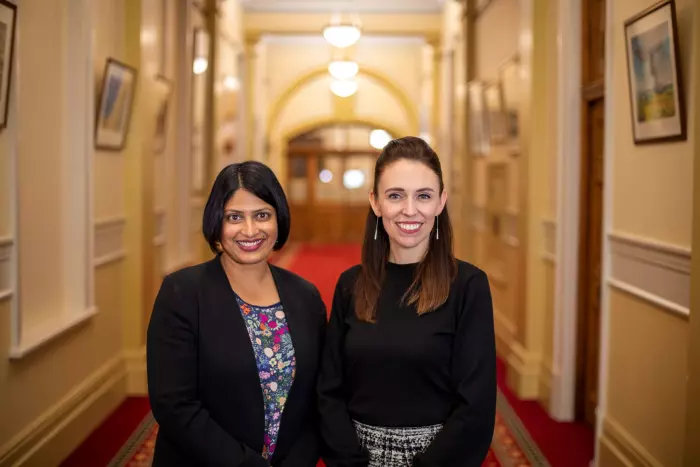Reducing reporting requirements for small charities and more accessible appeals are among the proposed changes to the Charities Act.
The minister for the community and voluntary sector, Priyanca Radhakrishnan, outlined the changes in an exclusive interview with BusinessDesk, which has been doing in-depth reporting on the charitable sector.
“If you look at the changes in their entirety, what we’re trying to do is strike that balance between reducing the compliance burden – the reporting and administrative burden for charities – and balance that with ensuring that the public still has trust and confidence in the sector,” she said.
The Charities Act dates back to 2005. In 2018, the government announced it would be reviewing the law to modernise legislation that applies to the 28,000 registered charities in New Zealand.
Critics have taken issue with the scope of the review, which didn’t consider factors like the tax status of charities, charitable purpose or advocacy. Radhakrishnan didn’t rule out a second tranche of reforms but said her focus has been on making pragmatic changes that would make a difference to charities in this term of government.
She intends to introduce a bill amending the act this year, meaning the proposed changes will be subject to a select committee process and could change.
Reporting standards
Charities have to file annual returns according to standards set by the External Reporting Board (XRB) within six months of their year-end balance date.
Analysis by BusinessDesk shows in any given year about 40% of charities either don’t file or file late.
One of the proposed changes is to exempt small charities from filing to the XRB standards and to enable regulation-making powers to set the exemption threshold.
A cabinet paper provided to BusinessDesk suggests charities spending $10,000 or less a year and with $30,000 or less in assets should be exempt, although they would still file a more simplified return.
“This will free up resources to allow volunteers to spend more time focused on communities and doing the mahi they are passionate about,” Radhakrishnan said.
About 12% of all charities would fall under the proposed threshold for exemption.
Appeals
As it stands, charities are only able to appeal decisions by the independent registration board, Te Rātā Atawhai, to the high court, putting an appeal out of reach for many charities, given the costs involved and the formal way evidence has to be submitted.
The government is proposing to expand the range of decisions that can be appealed beyond those made by the board, to significant decisions affecting charities made by Charities Services, the business unit which administers the act within the Department of Internal Affairs (DIA).
More significantly, it proposes that appeals should be heard first by the taxation review authority (TRA), a less formal and costly forum than the high court.
“It’s to make justice more accessible to charities,” she said.
Resourcing for the TRA to hear cases under the Charities Act was included in the budget, which also revealed the government was planning to increase the number of members on Te Rātā Atawhai from three to five.
The timeframe for lodging an appeal will also be extended from 20 working days to two months under the proposed changes, and so will the timeframe for submitting administrative information or objections to Charities Services or the board.
Radhakrishnan said the government was also proposing to make it easier for charities to talk through potential issues with Charities Services ahead of any decisions.
“There’s quite a formal process to provide evidence.
“We’re making a change so that they can actually just talk directly to the decision-maker, and sometimes these things can be sorted out just through a phone call or a chat before it gets to the process of a decision that then needs to be appealed.”
The registration board would have to publish decisions on deregistering charities or declining registration applications.
Accumulated funds
A major point of contention in the charitable world is when charities accumulate significant funds while making small or no distributions to further their charitable purpose.
There’s no requirement for charities to give out a set amount of their revenue, however, Charities Services has said it will ask questions if a charity is clearly not advancing its purpose.
A proposed non-legislative change would see Charities Services update the annual return form, in consultation with the sector and iwi, to require larger charities with expenses over $140,000 (tiers 1, 2 and 3) to declare and explain their accumulated funds, including assets.
“Many of New Zealand’s largest charities have significant unexplained accumulated funds,” Radhakrishnan said.
“It is important they are transparent about the reasons for holding on to a large quantity of funds, including donations. Transparency builds trust, and the public needs to be able to trust charities responsible with their tax-free income.”
Other changes
Other proposed changes include clarifying the definition of serious wrongdoing in the act so the part that refers to an offence refers to an offence punishable by imprisonment of two years or more, giving the charities registration board the power to disqualify an officer of a charity for serious wrongdoing or a persistent breach of obligations without first having to deregister the charity, and requiring charities to review their rules document every year.
The government is also proposing to amend the definition of 'officer' in the act, so it captures people with significant influence over the management or administration of an entity.
Radhakrishnan explained it by saying: “If you’re the CEO of a charity, you might not think you’re an officer because you’re not involved in the governance side of it, but you do exert significant influence over the charity, so you would be considered an officer.”
The past two years of the pandemic had highlighted the important role played by charities, the minister said.
“We are progressing tangible changes that will support charities to thrive while ensuring the public have trust and confidence in the charitable sector.”















